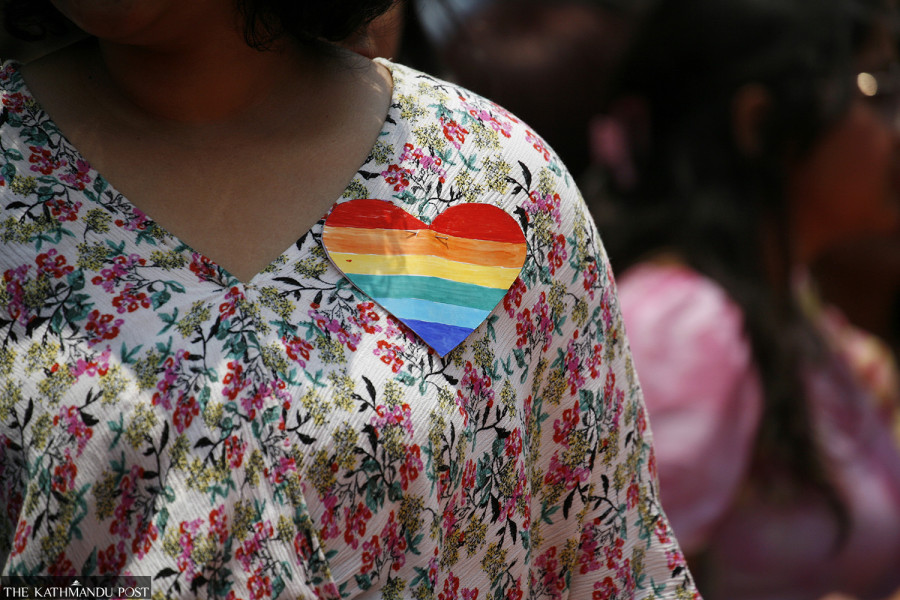National
Lack of gender affirmation healthcare results in raft of problems for trans people
Gender affirmation surgery not available in Nepal. Post-op problems are common but treatment hard to come by.
Manushree Mahat
F0r 28-year-old Rubina Tamang, gender affirmation surgery is a faraway dream. Tamang, who is pursuing her Bachelor’s degree, can’t afford the surgery and hence, has put it on the backburner. She has, however, been taking hormone replacement therapy (HRT) for a while, but that too comes with its own challenges, and for a transgender individual, the problem doesn’t end there.
Gender affirmation surgeries are procedures that provide the physical and functional abilities of one’s self-identified gender. A broader term that encompasses these changes in physical characteristics to suit one’s gender is ‘gender-affirming care’.
Tamang is a programme monitoring and documentation officer at the Blue Diamond Society, an NGO that works for the rights of the queer community. Between her education (where being called by her legal name has its own burden), her fight to obtain her citizenship, and the side effects of the hormones she consumes as part of her transition process, life isn’t easy.
Tamang began hormonal therapy five years ago. The beginning wasn’t smooth—she self-medicated based on the advice of her senior transgender friends. This wasn’t uncommon—and it still isn’t uncommon for medical practitioners to treat her like an alien.
Hospitals in the country are still not queer-friendly, Tamang says. “When we go to doctors, the prejudice is hard to miss,” she says. “Sometimes doctors end up questioning us about our own hormonal problems, as they have little knowledge about transgender healthcare. Some friends who’ve undergone the surgery may experience bleeding, and instead of getting treatment, they would end up being asked all kinds of demeaning questions.”
Taking HRT drugs isn’t a walk in the park either. The side effects can be often hard to bear. Well-known side effects include nausea, headache, and mood swings, which Tamang herself experiences.
“When I take medication, I can sleep well, but if I go off them, I can’t sleep all night, and I get anxious,” Tamang says. “With the drugs, sometimes it can get so difficult to concentrate that you start forgetting things.”
Some things have changed for the better though. The hormones she now consumes are examined and prescribed to her by doctors, and she has received counselling that has, to an extent, helped her make peace with herself.
The same can be said of 24-year-old Binu Limbu. For Limbu, going through gender affirmation surgery had been an old dream, which materialised in 2023. But the lack of access to the surgery in Nepal meant she had to travel to India. Including travel and surgery, she spent INR600,000.
“Things would be a lot easier if I had been able to undergo gender affirmation surgery right here in the country,” Limbu says. “The cost of travel and everything means the total amount will be high, and check-ups are mandatory following a critical surgery like this.”
Limbu says she could experience bleeding and other health problems in the future, but the medical help will be hard to come by.
“When we go to doctors with our bleeding genitalia, they get rather perturbed, not quite knowing what to do,” says Limbu.
For those who’ve completed a complicated surgery such as this, the post-surgery effects also go neglected and untreated.
“Gender affirmation surgery is a complex procedure—it changes your body in profound ways,” Limbu says. “Persistent weakness, anxiety, inability to think, bleeding—they are all part of it. But how do you cope with these effects when doctors themselves don’t know what to do?”
While taking HRT is common among Nepali transgenders, a big portion of the community uses HRT drugs without a doctor's prescription, which can result in severe health consequences, as Pratik Thapa has experienced.
Thapa, 28, began taking HRT drugs eight years ago but has now stopped. He came to realise that HRT drugs had caused his ovaries to swell.
“Doctors aren’t aware of a safe way to prescribe hormones to the transgender community which makes us hesitant to see them,” Thapa says. “Often, doctors would ask me offensive questions. This made me avoid seeking help until it was too late.”
Thapa’s complaints about Nepal’s healthcare system mirrors those of transgender communities all over the country. He hopes to get ‘top surgery’, but it will not be an easy process.
Gender affirmation surgeries comprise top and bottom surgeries. Top surgery generally involves reduction and enhancement of breast sizes, whereas bottom surgery involves reconstruction of genitali depending on the desires of the patients.
Thapa wishes that there were greater awareness and availability of top surgery in the country, as it would help him avoid years of pain and injuries. Chest binding, which is often practised by transgender men, to repress breasts, and present masculine features, was something Thapa himself did. But the downside is the possibly permanent back problems. Had there been greater access and awareness of surgical procedures, he thinks, it wouldn’t have come to this.
“Greater access to hormones and medical experts to prescribe them, and safe medical procedures for transgender community is a must to prevent these long-term health issues,” says Thapa.
Transgender healthcare is an all-encompassing experience, which also involves mental health. Research shows a higher proportion of transgender individuals experience mental health issues including depression, anxiety and suicidality compared to cisgender people. Lack of citizenship despite self-identification of one’s gender, social stigma, poor family support, discrimination often compound the problems.
“Everyday we have to face prejudice, and that mental toll is hard to bear. Then there are side-effects of our drug therapy. When we talk about transgender health, we have to talk about the mental health of the community,” says Tamang.
Transgender healthcare is a multifaceted topic that the government doesn't understand, says Rukshana Kapali of Queer Youth Group (QYG). Instead of treating the queer community as aliens, the government must understand that transgender healthcare is a part of the overall healthcare system, says Kapali.
Endocrinologists handle hormonal issues, and there are many endocrinologists in the country, Kapali says. “Doctors who return to Nepal after studying abroad work with transgender individuals,” she says. “It’s just that there are no clear regulations.”
This hampers the transgender community in many ways. Societal pressure to conform to the existing beauty standards make its members desperately seek hormonal therapy and gender affirmation surgery. According to Kapali, many feel pressured to change their features at the earliest, which often leads to self-medication.
“Doctors do a thorough medical examination, and then prescribe medication. But sometimes you get so desperate for acceptance that I’ve heard people take 3-4 pills a day to fast track their process,” says Kapali.
Despite steps by the transgender community to extend gender affirmation healthcare in the country, the government’s response has been poor.
Kapali filed an application at the Department of Health Services in February 2022, making a case for availability of gender affirmation healthcare for transgender individuals. She asked a series of questions about the availability of hormonal therapy, gender affirmation surgery and healthcare. She asked simple questions such as, “What kind of gender affirmation healthcare are found in Nepal, and where are they accessed?”
There was no response from the department. A case had to be filed first at the National Information Commission and then the Supreme Court, demanding a response. Only after this lengthy process did the answer come—albeit brief and unhelpful.
The department, in a reply that was a sentence long, stated that they were not aware of any gender affirmation surgery and healthcare available in the country.
Research shows dire effects of self-medication on both physical and mental health. Members of the transgender community have noted diabetes, thyroid, and mental health issues among those who self-medicate.
There is also an economic barrier wherein those transgender individuals who are not supported by their families cannot afford proper medical care, says Kapali.
Cases of malpractice during gender affirmation healthcare also happen often. For the Nepalis who have to travel to India and Thailand to undergo surgery, there are legal procedures to sue the hospital and services for malpractice.
“If gender affirmation surgery were available in Nepal, there would be insurance and accountability when things go wrong,” says Kapali.
Although gender affirmation surgery is unavailable, in 2022 the first hormonal and laser therapy clinic opened in Nepal. The FPAN hormonal and laser therapy clinic provides services tailored to the transgender community.
Working with an endocrinologist, dermatologist and psychiatrist, HRT can be accessed in the clinic jointly run by the Family Planning Association Nepal and the BDS. According to Swastika Lama, the clinic coordinator, patients undergo psychiatric assessment, and have to fill out a consent form, to begin their hormonal therapy.
The medication (government approved) provided can cost Rs800–Rs1,200 per file. The doctor’s appointment and check ups can cost Rs2,500–Rs3,000, which, according to Lama, is less than what other clinics ask for.
“Starting hormonal therapy based on a doctor's examination and prescription is a must,” Lama says. “We do blood tests, and full-body check-ups before prescribing medication, and doctors prescribe for the first three months only. Different people may react to hormones differently, which is why it’s important for medical experts to examine first.”
The clinic, however, doesn’t provide gender affirmation surgery. Lama agrees that the availability of surgery would make things a lot easier for transgender community.
“I myself have had gender affirmation surgery, and I’ll never glorify it,” Lama says. “But so many people from the community save money to travel out of Nepal for the surgery. If there are complications, they have to travel back and forth, and many can’t afford that.”
Many transgender individuals who’ve undergone gender affirmation surgery report having a better quality of life; 28-year-old Saya Rai, who travelled to New Delhi, is one of them.
“It’s just been about 2–3 months since I got the surgery, and thankfully I haven’t suffered any post-surgery effects,” Rai says. “I feel better about myself, and I’m happy.”




 13.12°C Kathmandu
13.12°C Kathmandu














